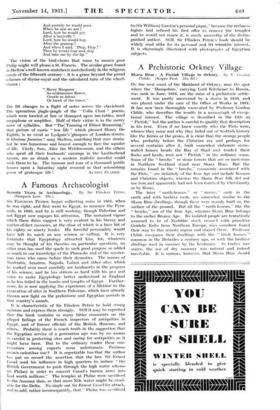A Famous Archaeologist
Seventy Years in Archaeology. By Sir Flinders Petrie. (Sampson Low. 18s.) SIR FLINDERS PETRIE began collecting coins in 1861, when he was eight, and first went to Egypt, to measure the Pyra- mids, in 1880, and he is still working, though Palestine and not Egypt now engages his attention. The sustained vigour which these dates suggest is very evident in his breezy and matter-of-fact memoirs, at the close of which is a bare list of his eighty or ninety books. his forceful personality would have left its mark on any science or calling. It is very fortunate that Egyptology attracted him, for, whatever may be thought of his theories on particular questions, no other man has used the spade to such good purpose or added so much to our knowledge of the Pharaohs and of the myster- ious races who came before their dynasties. The names of Naukratis, Amairna, Nagada, Lahun and other sites which he worked over most carefully are landmarks in the progress of his science, and he has striven as hard with his pen and voice to make Egyptology better understood in England as he has toiled in the tombs and temples of Egypt. Further- more, he is now applying the experience of a lifetime to the excavation of sites in Southern Palestine, which have already thrown new light on the prehistoric and Egyptian periods in that country's annals.
It is characteristic of Sir Flinders Petrie to hold strong opinions and express them strongly. Still it may be regretted that the book contains so many bitter comments on the alleged failings of the French inspectors of antiquities in Egypt, and of former officials of the British Museum, and others. Probably there is much truth in the suggestion that the Egyptian service of a generation ago was by no means so careful in protecting sites and caring for antiquities as it might have been. But to the ordinary reader these con- troversies among experts seem unfortunate. Tantaene animis ceslestibus irae? It is regrettable too that the author has put on record the assertion that the late Sir Ernest Cassel used his influence in high quarters to induce " the British Government to push through the high water scheme (at Philae) in order to convert Cassel's barren acres into land worth millions." The temples at Philae were sacrificed to the Assouan dam, so that more Nile water might be avail- able for the Delta. To single out Sir Ernest Cassel for attack, and to add, rather inconsequently, that Philae was sacrificed to (Sir William) Garstin's personal pique," because the archaeo- logists had refused his first offer to remove the temples and he would not renew it, is surely unworthy of the distin- guished author. Still, Sir Flinders Petrie's book should be widely read alike for its personal and its scientific interest. It is charmingly illustrated with photographs of Egyptian subjects.


































 Previous page
Previous page